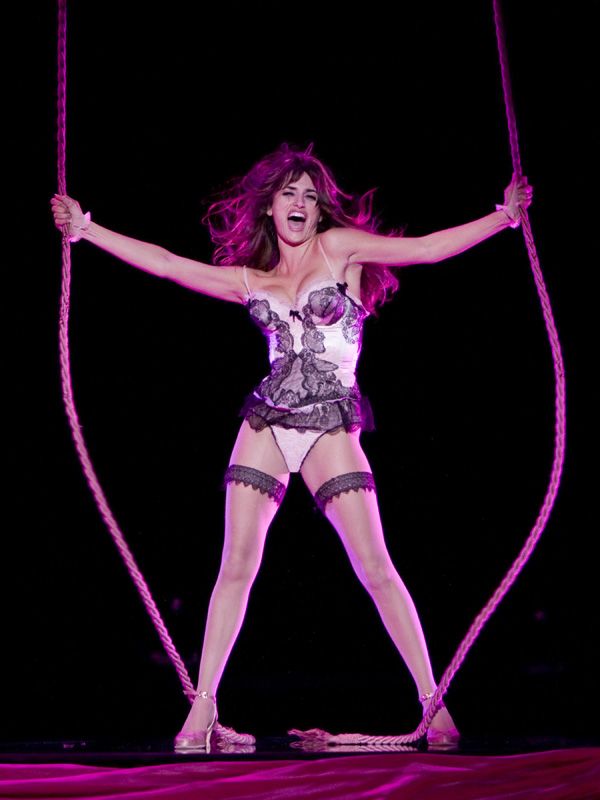 We're finishing up our viewing of the "nine" films... having seen District 9 over Christmas and last week just plain old 9, last night we watched the last, the musical Nine. I was not very excited about it being a musical, and Steve was less so, but I knew it had a Fellini tie-in and starred Daniel Day-Lewis. I thought I might also benefit from lowered expectations.
We're finishing up our viewing of the "nine" films... having seen District 9 over Christmas and last week just plain old 9, last night we watched the last, the musical Nine. I was not very excited about it being a musical, and Steve was less so, but I knew it had a Fellini tie-in and starred Daniel Day-Lewis. I thought I might also benefit from lowered expectations.And maybe I did. I'll just give the snapshot here: I liked everything about this movie except the musical numbers. After awhile we watched only the first minute of the musical numbers (well, I should say I did, as Steve fell asleep) and fast forwarded through the rest. The only ones I watched all the way through were Penelope Cruz's early sexy striptease number and Kate Hudson's go-go number. Kate Hudson can sing much better than I thought-- and the Goldie Hawn thing also caught my attention.
The acting is great and the plot is great, too. Or maybe I should say the concept, because it is more a concept than a fully realized story. Day-Lewis plays an Italian director Guido Cantini (Fellini) who is stuck trying to make his next film, Italia. The set is being built, the costumes made, the casting going on, but there's no script. What he is really struggling with is all his complicated relationships with women. There is his wife (played by Marion Cotillard), his mistress (Cruz, who was nominated for an Oscar), his mother (Sophia Loren) and his leading lady/muse (Nicole Kidman). Oh, and a whore on the beach (Fergie) who gave him his first lesson in sex-- I mean his first lesson in Caberet strip teases. Kate Hudson plays an American reporter from Vogue who attempts to seduce him and praises him for basically defining Italian style for the whole world.
There is a lot here: the whole virgin/whore thing, the wife/mistress, the female muse who could unite them or tip the scales one way or the other, America/Europe, etc. The Catholic Church shows up a few times, including a cardinal in the hotel he goes to for advice (hmmm, can't remember the advice, actually). The Church, as Italian, loves his films, but as Catholics is forced to denounce them (really just another riff on virgin/whore).
The director's conflicts aren't really resolved, and that's ok, but the annoying thing is the great possibilities built into the fact that the film in director Contini's head is an opportunity for staged musical numbers, that completely fails. Fails in imagination, in interesting music (despite the Oscar nomination for "Take It All"), in staging. What is Kurt Weill's Three Penny Opera" doing here? And why so much from Cabaret? It's not surprising that the director also did Chicago, because the numbers have a lot in common with that show as well. Add a little French cabaret and you have it-- a survey of French, German and eventually American Musical Theater cabaret performances. (Good thing Judi Dench, as the costumer for Cantini's film, is making lots of sequened scanty outfits.) I didn't realize Fellini loved the cabaret so much-- and what does it have to do with the Italian style he invented and gave to the world??
What I wanted was the musical numbers from Lars Von Trier's Dancer in the Dark. Wow. If he had brought in Bjork and turned her loose-- or better yet, found an Italian singer with a wild, urgent, ahead-of-its-time-but-totally-of-its-time sound to do the music, it truly could have done Fellini proud. If he'd set some dance numbers on a train or in a fountain or anywhere but that cheesy set left over from Chicago, I would not have been fast-forwarding. Where was the carnival?? Where were the circus freaks? Where was that cinema magic? Cause really, cabaret stripteases are SO BORING!
Ultimately, it seems like Contini is moving toward the ultimate Fellini film-- the one in which several female characters and one great artist live out a story that is worthy of the wit, style and extravagence of, well, Fellini. In a way, that is what 8 1/2 accomplished quite well-- and I wish they'd stayed closer to that script.
The whole idea of the film is to give us a view into Contini/Fellini's head. I do not know what I would see there, but i'm pretty certain it's not post-war European cabaret.




No comments:
Post a Comment